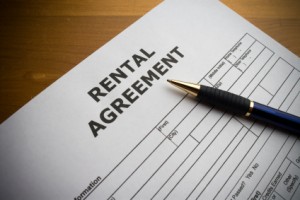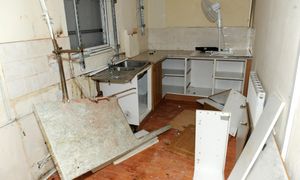Posted by Teresa on November 16, 2011 under Landlord Tips, Tenant Screening & Background Checks | 
 If methamphetamine-manufacturing tenants in Cuyahoga Falls, Ohio get busted, they are expected to pay the costs of cleaning up their labs and disposing of the hazardous waste. If they cannot pay for cleanup after their labs are discovered, their landlords are now responsible, thanks to a new amendment to an existing law.
If methamphetamine-manufacturing tenants in Cuyahoga Falls, Ohio get busted, they are expected to pay the costs of cleaning up their labs and disposing of the hazardous waste. If they cannot pay for cleanup after their labs are discovered, their landlords are now responsible, thanks to a new amendment to an existing law.
Until recently, state and federal funds paid for dismantling and removing labs, but that money has come to an end. The local police chief estimated cleanup costs of $1,000 to $5,000 for each meth lab. From removing traces of chemical residue, to dismantling and moving meth-related paraphernalia, landlords are on the hook for everything.
While recognizing that the majority of landlords don’t knowingly lease to drug manufacturers or dealers, the city council that passed the new law stated that it’s simply a cost of doing business.
Some landlords have attended training sessions about meth labs, including lessons on how to identify a lab and what to do if they find one. Meth labs are quick to set up, and the process of manufacturing meth uses easily acquired chemicals.
The real problem for landlords with meth lab cleanup costs is that insurance generally will not reimburse the expense. Not dealing with the problem is not an option. The chemicals used to make meth are extremely dangerous, and even traces of residue pose numerous health hazards, including liver, kidney and neurological damage, and increased risk of cancer.
What Is Involved in Cleaning Up a Meth Lab?
- The entire rental unit must be cleaned
- All traces of chemicals must be removed.
- Walls and ceilings painted
- Carpeting removed,
- All air filters replaced
- Ventilation systems cleaned
- Sinks and plumbing should be replaced
As the landlords of Cuyahoga Falls are discovering, meth labs are not a big-city problem. They are everywhere. The best way to avoid renting to drug manufacturers is to conduct thorough background checks and tenant screening on every applicant. If there is a history of drug convictions or other criminal records, you have the right to turn down the applicant.
Posted by Teresa on November 11, 2011 under Screening and Background Checks, Tenant Credit Checks, Tenant Screening & Background Checks | 
 Smart landlords always run tenant credit checks and prescreen tenants. They talk to applicants’ former landlords and check for criminal activity. But when the economy is so tough, many landlords find that screening tenants and making decisions on signing leases is based partly on data and partly on circumstance.
Smart landlords always run tenant credit checks and prescreen tenants. They talk to applicants’ former landlords and check for criminal activity. But when the economy is so tough, many landlords find that screening tenants and making decisions on signing leases is based partly on data and partly on circumstance.
For example, Wendy has been a landlord for many years, and has “seen it all.” She says that tenant credit scores are as volatile now as she can remember. “Some people with six-figure incomes have been forced to short sell their homes, and have lower credit scores as a result,” she said recently. “I’ve had to look more closely at their credit card and car payment history, and not just their credit score.” For Wendy, renting to people who recently owned and lost a home is less risky than renting to those who are continually late with rent payments or have history of evictions.
Mike, on the other hand, looks at credit scores and collection reports closely; he considers student loans collection activity to be a deal-breaker, but thinks medically-related collections reports are acceptable. “People can’t help what happens to their health,” he said. “Medical costs are outrageous and so many people don’t have insurance. I try to work with people who have had medical concerns.”
For most landlords we know, any eviction or rent collections activity on a prospective tenant’s credit report is not okay—even in these tough times. Bob is a fairly new and cautious landlord, who has been seeing more rent issues on credit reports. He always checks work references and tries to talk to as many landlords as he can. “Landlords usually tell me the real deal on their tenants. At first, I thought they’d give only good references, just to be done with a poor tenant, but I’m finding that they don’t want me to inherit their problems.”
Bob shared that he also talks to tenant applicants about any issues he finds on their credit reports. “I ask them why they didn’t pay their student loans, or what happened with the late car payments. Some will make excuses. Some will blame others. And a few own their credit problems and explain how they’re making them right.”
While credit scores are an important indicator of whether or not a tenant will qualify for a lease, many landlords indicate say that it’s not the only factor they consider. “A good rental and work history means more to me than a number,” says Brian. “I’m careful, but I prescreen and talk to work and landlord references before I make my decisions.”
Posted by Teresa on October 16, 2011 under Fair Housing Act, Tenant Credit Checks, Tenant Screening & Background Checks | 
 The rental market is going strong in most areas of the country, as more folks are renting instead of buying. While many landlords are enjoying high vacancy rates, they still need to be cautious; the economy has really hurt the credit scores and bill-paying ability of millions of Americans.
The rental market is going strong in most areas of the country, as more folks are renting instead of buying. While many landlords are enjoying high vacancy rates, they still need to be cautious; the economy has really hurt the credit scores and bill-paying ability of millions of Americans.
Every landlord has a different standard for accepting new tenants, but the importance of conducting thorough credit checks and tenant background checks is clear. This is the one area that experienced landlords will tell you not to skimp on, because if you do, you will more than likely regret it!
Tenant credit checks and background screening doesn’t take long, and can be inexpensive. Most landlords pass the fee on to the prospective tenant, and most tenants are accustomed to paying the fee. If you have an applicant who has a problem with paying the fee or signing the authorization to conduct a background screening, then you probably don’t want them as a tenant, do you?
The screening process begins with the lease application, where you may ask questions about the applicant’s address history, work history and credit history, and obtain contact information for previous landlords and personal references. You may ask if the applicant has ever broken a lease, if they paid rent on time, why they are moving now, and about their income.
You may not ask a potential tenant about race, religion, family status, disability, or any other information that might indicate a breach of the Fair Housing Act.
Be sure to obtain the applicant’s signature on a separate notice that informs him or her that you will be running a credit check and background screening, based on their name, date of birth and Social Security Number.
Most experienced landlords will also phone references and previous landlords. Be careful how you phrase your conversation, because too many tenant applicants will provide the phone numbers of friends who have agreed to pose as a landlord or employer. Simply identify yourself and ask the person on the other line, “How do you know Joe?” The correct answer may be “I’m his landlord,” or “He used to work for me.” If Joe gave you Tom’s name as a previous landlord, and Tom answers, “Joe and I are on a bowling team together,” you may have spotted an inconsistency in Joe’s story. Be on the lookout for more of them!
Finally, you should run a thorough tenant screening credit check to find out how the applicant pays bills, if they’ve filed for bankruptcy, and what their credit score is. A criminal background screening will reveal whether or not you have a convicted felon or sex offender applying to live in your rental property.
Don’t forget to trust your gut when screening tenants. You don’t have to give a reason for rejecting a tenant in most areas (check your state and local laws)—but do be careful and apply the same criteria to every applicant, or you could be accused of discrimination. You can’t reject an applicant solely for the color of their skin, but you can reject one because their credit score did not meet your minimum requirements—along with the bad feeling they gave you when you met them!
Posted by Teresa on May 2, 2011 under Lease and Rental Agreements, Tenant Screening & Background Checks | 
 We’ve often advocated that screening tenants begins with placing your For Rent ad. It should continue with the phone conversation you have with prospective tenants when they call in response to your ad.
We’ve often advocated that screening tenants begins with placing your For Rent ad. It should continue with the phone conversation you have with prospective tenants when they call in response to your ad.
But what exactly should a landlord ask each prospective lease applicant to avoid the tire-kickers and those whose credit and rental history make them ineligible to lease the property? Here are a few suggestions for questions to ask before showing your vacant rental units:
- Where do you live now?
- Are you currently renting?
- Why are you moving?
- How many people will be living with you?
- What kind of reference will your current landlord give you?
- What kind of reference will your previous landlords give you?
- What kind of work do you do?
- What types of pets do you have?*
- How many people who will be living in this unit are smokers?*
- We run credit and criminal background checks on every lease applicant over the age of 18. Will there be any issues there?
- We require a lease application and a fee to cover the background and credit check for each tenant over 18. Is there any problem with that?
- When do you want to move in?
- Will you have the first month’s rent and security deposit ready if we sign a lease?
- Do you have any questions about the process or the rental unit?
- Do you have a problem with any of these requirements?
*Asking “how many” rather than “do you have pets?” or “does anyone smoke?” often elicits an honest answer. If you do not allow pets or smokers, you’ve just eliminated the applicant.
Depending on the answers you get, the interested party may decide you are not the landlord for him or her. And you may decide they are not the tenant for you. Either way, you’ve saved your valuable time by avoiding showing the rental unit and going through the lease application process.
Posted by Teresa on February 24, 2011 under Landlord Tips, Tenant Screening & Background Checks | 
 Tenant screening is a several-step process. It begins with the lease application, where you obtain the lease applicant’s signature to run a background and credit check. It ends with phone calls and other verifications to check employers, previous landlords and other references listed by the tenant.
Tenant screening is a several-step process. It begins with the lease application, where you obtain the lease applicant’s signature to run a background and credit check. It ends with phone calls and other verifications to check employers, previous landlords and other references listed by the tenant.
In between is the professional tenant background check, which should include:
- SSN Validation
- OFAC/Patriot Act Search
- Evictions
- Bankruptcies
- Liens & Judgments
- Criminal Records Search
- Sex offender Search
- Credit Check
- Name and Address Validation
Skipping any of these necessary steps is usually a mistake – just ask landlords who have! You might be tempted to forget about calling previous landlords if the credit check comes out clean. You might be tempted to skip the tenant background screening if the applicant tells you up front that he had a drug conviction five years ago. When tenant applicants are so honest up front, they must have nothing else to hide, right? Maybe. Maybe not.
When your gut tells you someone is honest and deserves a chance, don’t listen! Do your due diligence and find out for sure if they can be trusted to live in your rental property, take care of it properly, and pay rent on time every single month.
Conducting due diligence on a potential tenant takes a little time and effort on your part. Experienced landlords will tell you to listen for clues when you’re talking to references and former landlords to determine whether you need to dig any further.
- Clue #1: Former landlord says that applicant was never any trouble and paid rent on time. Would happily rent to them again and again.
- Ask: Why are they moving? How long have you owned the property? How do you spell your name? What is the legal address of the rental property?
- Double-Check: Tax records to make sure the person you are talking to is indeed the owner of the property in question. Potential tenants have friends pose as landlords. How do you know you’re talking to the landlord? Hint: When calling the number, ask “how do you know John Doe?”
- Clue #2: Employer says applicant was never any trouble, makes enough money to cover rent and is still gainfully employed.
- Ask: What is your name and position at the company? Ask even if the name is on the application in front of you. Potential tenants have friends pose as supervisors.
- Double-Check: Google the company name, address, phone number. Call the business and ask for the person you were speaking to – don’t just call the number you were given.
- Clue #3: Tenant applicant cannot provide paystubs.
- Ask: For W2s or tax returns. If you don’t get them, move on to the next applicant.
Verifying tenant references is as important as formal tenant screening. Don’t base important decisions on your gut. Verify, then trust!
Posted by Teresa on February 4, 2011 under Landlord Tips, Tenant Screening & Background Checks | 
 Some landlords hire property managers because they are busy with their day jobs, others because they aren’t interested in managing properties, and still others because they simply don’t have enough time.
Some landlords hire property managers because they are busy with their day jobs, others because they aren’t interested in managing properties, and still others because they simply don’t have enough time.
But many would list another reason altogether: they don’t want direct contact with tenants. Plenty of landlords don’t have any issues with tenants knowing who they are or where they live. Others are a bit more on the cautious side, going so far as to refer to themselves as property managers when dealing with tenants, and using only P.O. boxes for correspondence.
How many degrees of separation are enough? And why would a landlord be so cautious? Here are some reasons why some landlords don’t want tenants to know where they live (or even who they are):
Disgruntled tenants: Some landlords fear for their personal safety or that of their families; they worry that an upset tenant will track them down and cause harm. They do not use their home or office address on leases, correspondence or any other paperwork the tenant will see.
Privacy: Some rental property owners tell tenants they are a manager or representative of the owners of the property to keep a few more layers between themselves and their tenants. Even if they are responsible for every action and decision made regarding the tenant and the property, they feel it can ease a tense situation to say, “this is the decision made by the partners,” or “this was my boss’s decision.”
Safety: Tenants sometimes think landlords are wealthy; many landlords worry that when tenants know where they live, they are an easy target for theft.
Keeping it all business: Finally, many landlords feel that their relationship with tenants is strictly business and should remain completely separate from their private lives—including where they reside.
If a tenant really wants to track down their landlord, they probably will. And tenants who go to any length of trouble to discover where you live are likely looking for trouble. Screening tenants can help reduce the risk of harm to you and your property.
Posted by Teresa on January 25, 2011 under Landlord Tips, Tenant Screening & Background Checks | 
 He said it best himself: “Check your tenants out before you let them occupy. That’s the one thing I was guilty of.” A Florida man is out more than $15,000 in damages after thieves, who may or may not have been his tenants, ripped off everything that wasn’t nailed down from his rental house.
He said it best himself: “Check your tenants out before you let them occupy. That’s the one thing I was guilty of.” A Florida man is out more than $15,000 in damages after thieves, who may or may not have been his tenants, ripped off everything that wasn’t nailed down from his rental house.
Actually, they did steal or damage several items that were nailed down, screwed in, glued on and attached to the structure. Here’s a partial list:
- The kitchen sink
- The carpeting
- The phone lines
- The kitchen island
- The kitchen appliances
- The kitchen cabinets
- The toilets
- The hot water heater
- The air conditioning unit
- The countertops
How could this happen? First of all, the house was in Florida and the landlord lived in Washington state. Next, he apparently had not received a rent payment “in months.” It was only then that he attempted to contact the tenants. Unsuccessful at reaching them, he trekked across the country to check on the rental house—only to find it stripped.
The homeowner is new at the landlord business. Purchased as an investment he decided to rent the home after unsuccessful attempts to sell it. Out-of-state owners sometimes make classic landlord errors that might have prevented this loss:
- No local property manager. When you live 3,500 miles from your rental property, it’s very difficult to keep an eye on things. Spending the money for a good property manager can prevent losses such as this one.
- No relationship with neighbors. How many neighbors saw the house being stripped? Surely the thieves had a handy excuse for what they were doing, but had the landlord made one contact, even one neighbor who had agreed to call if they noticed anything unusual, he might have helped prevent this theft.
- No tenant pre-screening. The landlord did not conduct a background check or pre-screening or any kind on the tenants. He had homeowner’s insurance, of course. But he didn’t really know who was renting his home. Tenant screening is simply a must-do when leasing rental property. Just like paying taxes, doing maintenance and buying insurance. Especially when the rental property and the rental property owner are separated by thousands of miles.
Perhaps this major theft could have been avoided. While the landlord doesn’t know for sure that the tenants were involved, he has not been able to reach them for months. Screening them thoroughly would have at least informed the landlord whether they were credit worthy, had a good rental history, and had any criminal history. It’s always better to be safe than stripped!
Posted by Teresa on January 11, 2011 under Landlord Tenant Lawsuits, Tenant Screening & Background Checks | 
 You’re probably familiar with the news story about a house in Escondido, CA, where the resident is accused of making bombs and plotting bank robberies. Because of danger to neighbors, the decision was made to burn the house completely to the ground.
You’re probably familiar with the news story about a house in Escondido, CA, where the resident is accused of making bombs and plotting bank robberies. Because of danger to neighbors, the decision was made to burn the house completely to the ground.
Now the question is, “Who’s responsible for the compensating the property owners?” While the county made the decision to destroy the house in the interest of public safety, where did that leave the owners of the home, who rented it to the accused bomb maker? Should the owners’ insurance company reimburse them for the loss? Or is this a necessary expense of the taxpayers of San Diego County, who are already burdened with the expenses of removing the hazard and the resulting cleanup?
Obviously, the accused man, George Jakubec, bears the full responsibility for his actions. But it’s doubtful he’ll have the ability to repay the homeowner. Some say the landlords should be responsible for their loss and to the county for all expenses because of negligence—that they should have known of this tenant’s activities. Questions have arisen about whether proper tenant pre-screening and periodic inspections were conducted.
However, there is no proof that the landlords didn’t screen the tenant prior to signing a lease. Even if they had, the suspect’s crime record has not been released, so we don’t know whether or not he had a criminal record that would have prevented the landlord from renting the property to him.
Most landlords know that their tenants have the right to peaceful habitation, without harassment or unnecessary inspections. However, landlords who care about their properties schedule periodic maintenance to not only protect the property value, but to ensure that illegal or dangerous activity is not taking place.
In the Escondido case, the landlord’s attorney has filed a claim with San Diego County, asserting that no legal justification existed to burn the house. Further, the claim states the eminent domain procedures that would have compensated the property owners were not followed. We’ll keep watching for updates.
In the meantime, a word to the wise: keep conducting thorough tenant screening and background checks, and schedule periodic inspections of your rental properties. It’s so much better to be safe than sorry!
Posted by Teresa on January 4, 2011 under Landlord Tips, Tenant Screening & Background Checks | 
 We recently heard from Jason, a fairly new landlord, regarding a common problem: a tenant who calls the police—a lot. “I did my due diligence and ran a tenant background check and criminal screening on her, and she came through with flying colors. Unfortunately, I can’t say the same about some of her former friends,” Jason said.
We recently heard from Jason, a fairly new landlord, regarding a common problem: a tenant who calls the police—a lot. “I did my due diligence and ran a tenant background check and criminal screening on her, and she came through with flying colors. Unfortunately, I can’t say the same about some of her former friends,” Jason said.
After the tenant moved in, her former boyfriend started showing up, uninvited. She felt harassed and seemed to be unable to get him to leave on her own. “She calls the cops at least once a week,” said Jason. “It looks bad to the neighborhood and it concerns my other tenants. I’m thinking about evicting her.”
Jason was rightly concerned that he could be in violation of the law if he proceeded with eviction. He planned to contact his attorney to be sure. But what should a landlord do when an otherwise perfect tenant makes his or her personal problems a larger issue? If the tenant has done nothing wrong, is it fair to force her out?
One landlord said the best course is to encourage the tenant to seek a restraining order, or to refer the tenant to a domestic violence prevention center. Another mentioned that if the tenant is not an innocent victim, but rather calls the police for minor issues that the landlord or property manager should be handling, it could be more of a nuisance issue. In this case, eviction could be the proper recourse to allow other tenants quiet enjoyment of their homes.
Landlords cannot generally evict tenants when they are exercising their rights. And, it is certainly up to the management to control tenant actions when they affect others. Most landlords we talked to about Jason’s case indicated they would get involved in the situation in order to prevent a possible escalation of harassment. Obviously, confronting the ex-boyfriend is not a good idea, but helping the tenant seek a restraining order is much better than doing nothing. Evicting her would only compound the problem.
When you are a rental property owner, it is in your best interest and that of your tenants to provide a safe environment. This tenant’s calls to the police could be a wake-up call for the landlord to get involved. Remember, when it comes to bullies like this tenant’s ex-boyfriend, stay safe and let the police do their jobs!
Posted by Teresa on December 7, 2010 under Tenant Credit Checks, Tenant Screening & Background Checks | 
 Why Pre-Screen Tenant Applicants?
Why Pre-Screen Tenant Applicants?
There are several advantages to screening tenants prior to signing a lease. One is that you can avoid discrimination issues by applying the same approval standards to every lease applicant—including a standard background and credit check. Another advantage is the reduction of risk. Why take a chance on a tenant who could have a history of evictions or an income that cannot support the rent? Mitigate risk by conducting a thorough credit check on every tenant.
What Will I Learn From a Tenant Credit Check?
You can learn at a glance if your prospective tenant pays credit card bills and loans promptly, as well as if there are any outstanding judgments against him or her. Previous bankruptcies are also typically reported. or bankruptcy filings. You can determine the minimum level of approval for your applicants, based on a good record of responsible finances and living within their means.
Be sure to compare the report’s list of an applicant’s previous addresses with those provided on the lease application. Are there inconsistencies? If so, the tenant is hiding something, or there is a legitimate explanation. Either way, you need to know before you sign a lease.
The information you gather from a tenant credit report must be held in strictest confidence, and never shared with third parties. Your applicant may have a right to the report—check your state’s guidelines and the Fair Credit Reporting Act (FCRA) to be sure you are compliant. If you reject an applicant for credit reasons, you must advise them in writing. Your best and easiest way to screen tenants is through a reputable, professional tenant screening service.
Consistency Counts When Screening Tenants
It’s important to be consistent when it comes to pre-screening tenants.
- Screen all lease applicants, no matter how they look, dress, or what kind of car they drive.
- Use the same screening procedures for each prospective tenant. Exceptions could be interpreted as favoritism toward or discrimination against a certain group.
- Establish a clear policy of background checks on all applicants to protect your rental property business.
Remember! Use a screening service with nationwide coverage and access to all three credit bureaus.
 If methamphetamine-manufacturing tenants in Cuyahoga Falls, Ohio get busted, they are expected to pay the costs of cleaning up their labs and disposing of the hazardous waste. If they cannot pay for cleanup after their labs are discovered, their landlords are now responsible, thanks to a new amendment to an existing law.
If methamphetamine-manufacturing tenants in Cuyahoga Falls, Ohio get busted, they are expected to pay the costs of cleaning up their labs and disposing of the hazardous waste. If they cannot pay for cleanup after their labs are discovered, their landlords are now responsible, thanks to a new amendment to an existing law.







